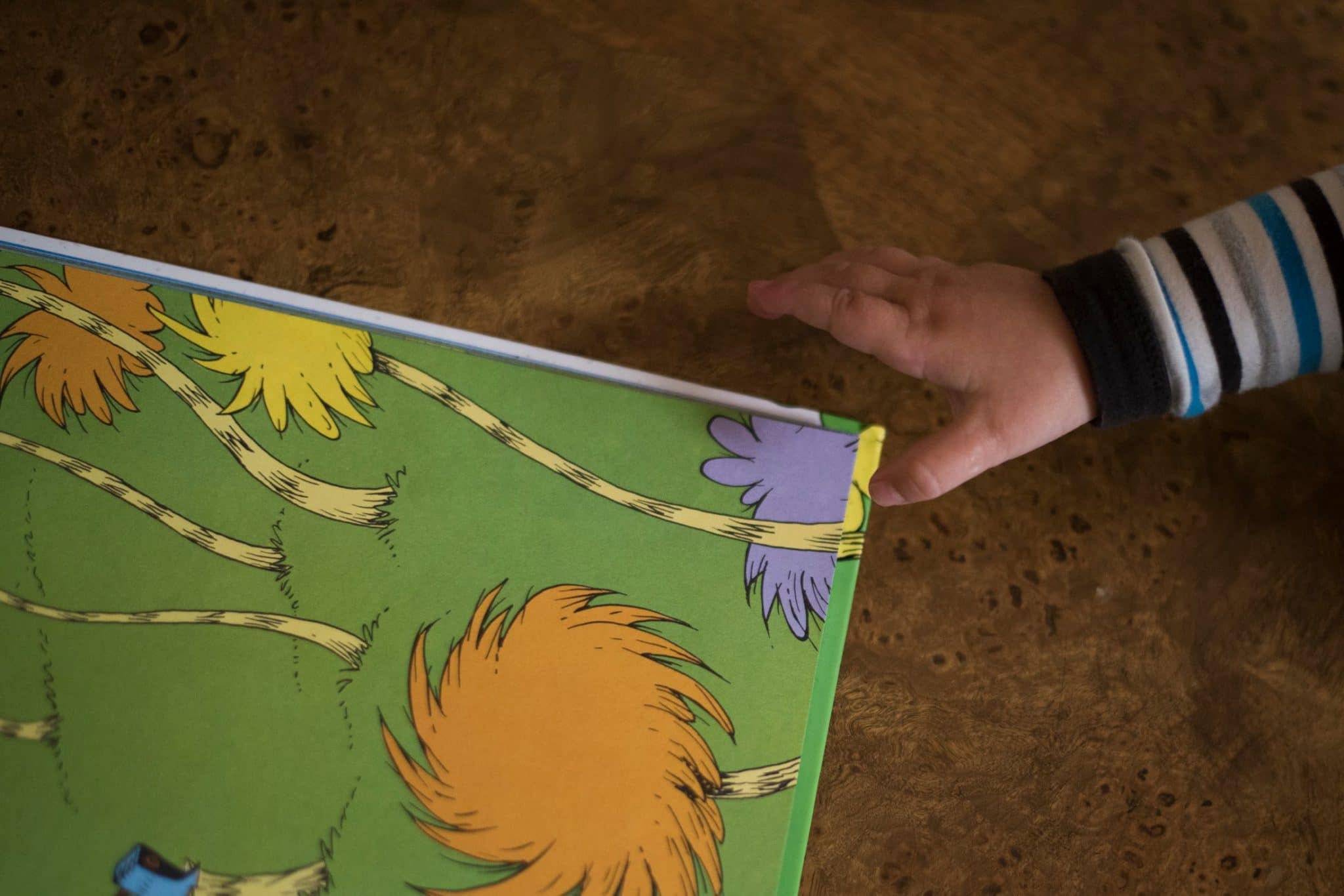This 3-part guide to becoming a parent will help you honor and deepen the meaning of your transition into this new, profound stage of life.
The first part of this guide is about welcoming change, owning your journey, and finding the supportive community and rituals that will sustain you along the way.

Becoming a parent is just as much about personal transformation and growth as it is an opportunity to look back at our ancestors, who have paved the way for us. In fact, the very first divine rule, commandment numero uno of 613 found in the Torah, is “to be fruitful and multiply.”
Today, it is increasingly possible for any person to fulfill this life-altering mitzvah. We recognize the beautiful breadth of experiences that exist on the various paths to parenting, including pregnant women, parents who did not personally give birth, people experiencing fertility challenges, folks across the gender and sexuality spectrum, and supportive friends and family. We encourage you to share your feedback and personal practices with us if your experience is missing from this resource (send us a personal note or contribute to our crowdsourced kit).
? Make note! ? This guide is not about scientific or health-related how-tos (please, go to your doctor or midwife or doula for those!). Our focus is on spiritual practices – Jewish and otherwise – that bring you closer to the mystical experience of becoming a parent.

First Things First
Pause. Breathe. Reflect.
The people of Israel and the priests were fascinated with the process of creating a pure, holy physical space (read Leviticus and you’ll see what we mean). As you embark on your family building journey, how will you create a sacred space – a physical or metaphorical womb – of your own?
Why do you want to become a parent? What are your hopes and expectations for this life transition? Who do you need support from and when? What is your Jewish connection and how will you pass it on to your child?
These are big questions that require deep inner work. You may have your to-do list in hand when it comes to the conception or adoption process you have in mind, but diving back into your own childhood experience or articulating the role Judaism will play in your child’s life may be challenging explorations that you need time, space, and help to embark upon, alone or with your partner.
Idit Klein, an activist for equality and social justice and the Executive Director of Keshet, a national organization which works for the full equality and inclusion of lesbian, gay, bisexual, transgender, and queer Jews in Jewish life, shared this reflection with us:
What is the specific Torah that queer people have to bring to the Jewish community? The concept of coming out.
It’s relevant to every human who has ever lived. We all have ways that we struggle to align our interior selves and our lives as they are in the world. At some point, everyone faces coming out about some aspect of their identity or experience.
LGBTQ people have learned how to find pride and power in coming out. When I think about queer families, I know that a lot of the questions that come up in our lives are questions that perhaps hadn’t occurred to straight parents to ask, but they now appreciate and ask such questions themselves.
Ask yourself
Setting aside time to ponder, prepare for, and bring proper intention to becoming a parent may be soothing for some and overwhelming for others.
Don’t get caught up in answering every single one of these questions correctly or definitively. We all know what happens to the best laid plans! The real opportunity here is make time and space to reflect on this big life transition, practically and spiritually, and to build a new awareness of yourself and the values you want to pass on to your child.
Why do I want to become a parent, and why now?
How should I become a parent (e.g., pregnancy, adoption, surrogacy, etc.)? What if my preferred method doesn’t work?
Am I emotionally ready to become a parent? Is there anything I need to work through before parenting a child?
Can I afford to become a parent? How will I support my child financially?
What impact will becoming a parent have on my career?
How will I make parenting work on a daily basis? What are my needs and do I have structures in place to support them? How much help will I need, for how long, and from whom?
Which religious beliefs or values do I want to bring into my pregnancy and/or pass on to my child? What does it mean to be a Jewish parent?
Which positive values and experiences did my parents give me that I’ll pass on to my own child?
Will I love my child for who they are? How will I handle a disability or coming out of any kind?
If you have a partner: How strong is my relationship with my partner? How will we keep it strong and make time for us after we become parents? Are we on the same page about how we want to parent?

Mind & Body
In Jewish tradition, conception and birth are spiritual acts, not just physical feats. The creation of a new life is the result of a partnership between the parents and the Divine, and each new baby is sacred and essential for building the world.
In A Time to be Born, psychologist and folklorist Michele Klein writes that, from ancient to modern times, Jews have believed that what a mother sees before or during conception and the moods of the parents when conceiving have an impact on the baby. The Zohar says that when a couple unites in love and joy, in purity of mind and body, to procreate, their thoughts rise up and reach the celestial paradise where their baby is conceived in the divine realm.
Rabbi Lori of Open Temple, an emerging Jewish community in Venice, CA rooted in wonder and openness, took her ancestors’ experiences to heart – and body – while trying to conceive:
I thought, if I want to get pregnant, I need to eat like my ancestors. My vegan self started to eat brisket and matzo ball soup. If it worked for them, genetically, I believed, it’ll work for me. I stopped working out – our ancestors didn’t go to barre class – and focused on chilling and receiving. I had people visit, I got blessed, and I gave blessings.
Gaining an intimate understanding of your own body and your partner’s can strengthen your intuition and magnify the spiritual experience of creating life. Anyone on the path to parenting can benefit from self-care that prepares and nourishes you throughout an experience that can be stressful or anxiety-inducing.
We suggest you try one (or all!) of the following embodied rituals and exercises to get physically rooted in and emotionally ready for your parenting journey.
Know your cycle
At The Well, which brings women together at the intersection of wellness and Jewish spirituality, and Brilliant Bodies, a doula duo that was born to inspire awareness of body and mind, teamed up to create an excellent starter guide to getting down with your cycle.
Check in with yourself
Cycles + Sex, an organization that teaches people about reproductive health and sex, tapped into its network of experts especially for us and offered a variety of perspectives, which you’ll see throughout our 3 guides, on how to infuse the path to parenthood with spirituality.
First up: a simple, daily practice from Debra Pascali-Bonaro, world-renowned doula and founder of Pain to Power Childbirth and Orgasmic Birth, that any hopeful parent-to-be can try.
Check in with yourself daily to see how you are feeling.
Ask yourself to choose a number between 1-10 that represents how prepared you feel in your body, mind, and spirit to welcome a child. If you are not a 10 across the board, think about what it would take to get there.
Meditate for inner strength
According to Expectful, a platform that makes it easy for hopeful, pregnant, and new moms to meditate, meditation during fertility has been shown to increase your chances of conception by reducing stress and balancing hormones. Meditation has also been shown to strengthen relationships, enhance immunity, and improve sleep. Get those Z’s in before the baby comes!
Try Expectful’s 10-minute guided meditation “Trusting Your Journey” and sign up for a 31-day free trial (twice their normal 14-day free trial) just for Arq community members.
Get tested
If you are a first-time parent, you may want to consider genetic testing before trying to conceive. If you’re taking the IVF route, you may also want to ensure your donor has been tested.
According to JScreen, the emerging consensus among medical professionals is that every Jewish adult should be offered genetic testing before a pregnancy, but you may also want to get tested if you’re not Jewish, since the majority of babies with genetic diseases are born to parents with no known family history of that disease.
Genetic testing is totally up to you. Discuss this with your partner or the friends and family who support you. Take time to consider whether or not you want this information upfront and, if you discover that your pregnancy is at risk, how you’ll cope and what actions you’ll take.

Struggling to Become a Parent
Merissa Nathan Gerson, a freelance writer and educator who focuses on sex, Judaism, and the inheritance of trauma and memory (and another expert whom the Cycles + Sex team sent our way) reminds us:
Since biblical times, women have struggled with infertility. In fact, all of the matriarchs had trouble getting pregnant. Sarah, the first matriarch, was infertile for over 100 years, and, when she finally gave birth to her son, she named him Isaac – from the root of the Hebrew word for laughter – because of how ridiculous and amusing it was that she bore a son at her age.
Use the example of the matriarchs as a way to re-approach how we feel about the time it takes to become a parent.
Like Sarah realized, the universe often has a funny way of doing things, yet, once they happen, you realize it couldn’t have happened any other way. Trying to control time will only yield negative results and emotions. Do your best to let go. The process of pregnancy and birth is especially absurd, since it occurs in our own body, but we really have no control over it! View this paradox as part of what makes this process so beautiful; live with the paradox.
Some say, live for today, not the future. Go out to dinner with your partner or your friends. Go to SoulCycle or take your daily morning run. Or, others say, be cautious. Don’t get too invested. Protect yourself emotionally.
Rabbi David Curiel and his partner, Amberly, are adoptive parents, and they decided to “go in on love and hope all the way.”
As David and Amberly waited to be matched with a birth family, the global wisdom passed on to them was not to become attached, don’t set yourself up for disappointment. But, as David puts it, that was like telling someone who’s just begun dating not to fall in love until the other person proposes. Adoption was scary and vulnerable for David and Amberly, but what felt most authentic to them was committing their hearts fully and letting themselves fall in love with each birth family and baby they hoped to match with and putting their faith and hope into the process and eventual positive outcome.
Say a little prayer
Asking for what we want and need – feeling heard – is one ancient Jewish remedy for those who are struggling to become parents.
Admittedly, the background for this practice is, as they say, complicated. One interpretation of the foremothers is that God closed their wombs because he wanted to hear their prayers, and, when they did pray, they conceived. We’re not saying that becoming a parent is dependent on prayer, but it can be empowering and strengthen your resolve and spirituality.
There is also a Jewish tradition of meeting with or praying at the tombs of holy men and women. Whom do you look up to for their moral depth, spirituality, or wisdom? Maybe you make the pilgrimage to Rachel’s tomb and find solace in the reminder that your struggle is one many have shared for thousands of years or you visit a wise grandparent, teacher, or friend for support and new perspectives.
Ritualwell offers a treasure trove of old and new blessings for people whose pathway to parenting feels uncertain or challenging, and Uprooted helps Jewish families experiencing infertility find community and counsel. The Jewish community has always placed a focus on building families, and there are now organizations like Hasidah and local funds like the JFCS Fertility Fund and the Sarah Lily Fund for Adoption that make loans to Jewish parents-to-be for IVF and adoption so they can fulfill that dream.
Charms & potions
Jewish women hoping to conceive have worn or kept an even tekuma, a special, ruby-like stone believed to ward off miscarriage. As A Time to be Born explains, the Hebrew for “red” is “adom,” which is similar to the word “adam,” meaning “man”; perhaps, the former may bring on the latter. Wearing a red gem or tying a red string to your wrist as you try to become a parent may connect you to generations past and provide a comforting sense of hope.
Other segulot, protective charms and rituals in the Kabbalah and Talmud, for healthy pregnancies include carrying around the key to the tomb of a holy person and making sure your holy books are stored upright to prevent a breech birth. At the very least, taking some time to tidy up your house may offer a welcome distraction or sense of accomplishment during a time when you feel you have little control.
Sephardic women tied roots to their bodies and ancient Hebrews believed a mandrake root and apple soaked in wine could help with conception. A Time to be Born provides another example of Hebrew gematria: the Hebrew word for “willow,” “aravah,” is numerically equivalent to “zera,” meaning “male seed,” so women also drank infusions of willow leaves in hopes of conceiving. Mandrake has some scary associations and, more importantly, may be poisonous. Willow bark’s therapeutic properties are real, but a doctor should approve your use of this natural remedy. How about a soothing ginger root tea with lemon and mint, instead?

A Ritual For Everyone:
The Mikveh
Rabbi Sara Luria is a community builder, birth doula, chaplain, and founder of ImmerseNYC, which facilitates welcoming, transformative ritual baths for a diverse Jewish community. In moments of transition, we want to feel rooted, and Sara believes in the power of the mikveh to be a solid foundation as we enter into the unknown.
The mikveh is a ritual that Sara trusts for the realest moments of our lives: partnering, trying to become a parent, not getting pregnant, losing a pregnancy or baby, giving birth, becoming a parent, weaning. There are endless moments throughout the process of becoming a parent that require personal transition and that involve feelings of both loss and gain.
The mikveh, according to Sara, is a Jewish space where we can stand face to face with our experiences, be honest about the complexity of what we’re going through, mourn what we’re letting go of, and be excited about what is to come.
During challenging, isolating times, the mikveh can also help us feel more connected to ourselves, creating a space for us to examine how we’re doing, to reflect upon our struggle, and to connect us to a community of people – ancient and present – who have immersed, as well. The mikveh can help us feel more connected to that which connects all of us: call it God, joy, struggle, hope, or, just water.
Prepping for immersion
Whether you’re considering a dip in the mikveh to acknowledge an internal transition – “I am ready to be a parent” – or you’re looking to let go of fear, disappointment, or anxiety, ImmerseNYC’s guide to prepping for your ritual bath will get you ready.
Want some extra guidance? The ritual creation team at Mayyim Hayyim, a community mikveh in Boston, has developed a library of original ceremonies to help personalize your mikveh experience.

There's No Right Way
Whoever you are, however you’re approaching becoming a parent or experiencing the process in actuality, this is an incredible life transition that deserves pause and meaning.
There’s no right way in. There’s no singular path.
In the exercise below, Myisha Battle, dating and sex coach and host of the sex-positive podcast Down for Whatever, encourages hopeful parents to welcome what comes.
Appreciate the process
No matter how you are starting your family, there is a process involved in having a child. That process can be emotionally challenging, especially if you are dealing with fertility concerns, using a surrogate or managing the barrage of paperwork involved in adoption. The conception process is also often an emotionally arduous one as well.
Cultivating a practice of appreciation and gratitude can not only help mitigate the stress involved in starting a family, it can energetically imbue positivity and hope into the process along the way.
To get started, acknowledge the process for what it is: an opportunity to bring a new life in your home and family. Recognize your personal ongoing commitments that need to be honored to move the process forward and agree that you will bring your best self to those moments when you are needed.
Conclude each milestone you achieve with gratitude. Here are some examples:
“I am so grateful that we were able to have sex during a fertile window. It’s exciting to think about what could happen from here.”
“I am grateful that we got everything in order to send to the adoption agency today. It feels so good to be one step further to bringing our child home.”
If you are partnered, it’s really helpful to share appreciations with one another aloud so you can both hear what the other is grateful for. This is a great opportunity for bonding. You can also swap appreciations of one another.
Create your own rituals
While Jewish tradition has many meaningful ceremonial resources for some of life’s transitions, you might want a creative or personalized ritual that speaks to the senses, incorporates nature, and brings alive a diversity of voices.
Sarah Chandler, a Brooklyn-based educator, artist, activist, poet, and Hebrew priestess, created a do-it-yourself guide (with help from Rabbi Jill Hammer and Kohenet Ketzirah Lesser) just for us to help anyone imagine rituals that honor the experience of becoming a parent.
Whether you want to gather friends for an alternative baby shower that includes a ritual for a person who is becoming a parent for the first time or you simply want to clear the energy of the newly painted nursery, this framework will help you weave together key symbols and excerpts from Jewish tradition to create something meaningful.
You might also like Part II of our guide to becoming a parent, which is all about expecting your baby’s arrival.
? ? ? ? ?
Speaking of labors of love, this guide is a product of the wisdom and generosity of many.
Special thanks to Idit Klein of Keshet, Igael Gurin-Malous, Mark Krassner of Expectful, Rabbi David Curiel of Asiyah, Rabbi Lori Shapiro of Open Temple, Rabbi Sara Luria of ImmerseNYC and Beloved, Samantha Sharon of Cycles+Sex, Sarah Chandler, and Sarah Waxman of At The Well.
Images (in order of appearance) by Daiga Ellaby (thumbnail), Tim Gibson, Elena Mudd, Matheus Ferrero, Akshar Dave, Ryan Christodoulou, Elena Mudd.
Thank you for visiting Arq!
Arq is no longer publishing new content. We hope you'll enjoy our archived posts.